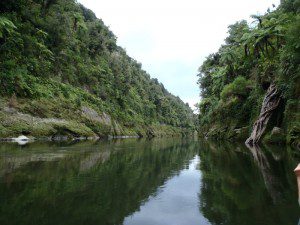By Stephen Messenger – Treehugger
From the dawn of history, and in cultures throughout the world, humans have been prone to imbue Earth’s life-giving rivers with qualities of life itself — a fitting tribute, no doubt, to the wellsprings upon which our past (and present) civilizations so heavily rely. But while modern thought has come to regard these essential waterways more clinically over the centuries, that might all be changing once again.
Meet the Whanganui. You might call it a river, but in the eyes of the law, it has the standings of a person.
In a landmark case for the Rights of Nature, officials in New Zealand recently granted the Whanganui, the nation’s third-longest river, with legal personhood “in the same way a company is, which will give it rights and interests”. The decision follows a long court battle for the river’s personhood initiated by the Whanganui River iwi, an indigenous community with strong cultural ties to the waterway.
Under the settlement, the river is regarded as a protected entity, under an arrangement in which representatives from both the iwi and the national government will serve as legal custodians towards the Whanganui’s best interests.
“Today’s agreement which recognises the status of the river as Te Awa Tupua (an integrated, living whole) and the inextricable relationship of iwi with the river is a major step towards the resolution of the historical grievances of Whanganui iwi and is important nationally,” says New Zealand’s Minister for Treaty for Waitangi Negotiations, Christopher Finlayson.
“Whanganui Iwi also recognise the value others place on the river and wanted to ensure that all stakeholders and the river community as a whole are actively engaged in developing the long-term future of the river and ensuring its wellbeing,” says Finlayson.
Although this is likely the first time a single river has been granted such a distinction under the law, chances are it’s not the last. In 2008, Ecuador passed similar ruling giving its forests, lakes, and waterways rights on par with humans in order to ensure their protection from harmful practices.
And, while it may seem an odd extension of rights, in many ways it harkens back to a time when mankind’s fate was more readily acknowledged as being intertwined with that of the rivers, lakes, and streams that sustained us — a time in which our purer instincts towards preserving nature needn’t be dictated by legislation.
About the Author
Stephen is a freelance writer and linguist based in Porto Alegre, Brazil. He covers issues related to the environmental movement in South America, as well as to the political and social challenges of sustainable development in the region and throughout the world. Stephen’s work has appeared in numerous publications both online and in print, including the Wall Street Journal, Yahoo!, and the Huffington Post.
Follow Stephen Messenger on Twitter and RSS!

If you've ever found value in our articles, we'd greatly appreciate your support by purchasing Mindful Meditation Techniques for Kids - A Practical Guide for Adults to Empower Kids with the Gift of Inner Peace and Resilience for Life.
In the spirit of mindfulness, we encourage you to choose the paperback version. Delve into its pages away from screen glare and notifications, allowing yourself to fully immerse in the transformative practices within. The physical book enriches the learning process and serves as a tangible commitment to mindfulness, easily shared among family and friends.
Over the past few years, Wake Up World has faced significant online censorship, impacting our financial ability to stay online. Instead of soliciting donations, we're exploring win-win solutions with our readers to remain financially viable. Moving into book publishing, we hope to secure ongoing funds to continue our mission. With over 8,500 articles published in the past 13 years, we are committed to keeping our content free and accessible to everyone, without resorting to a paywall.







